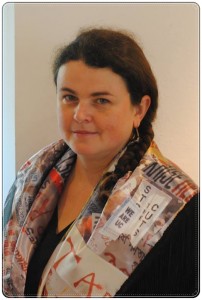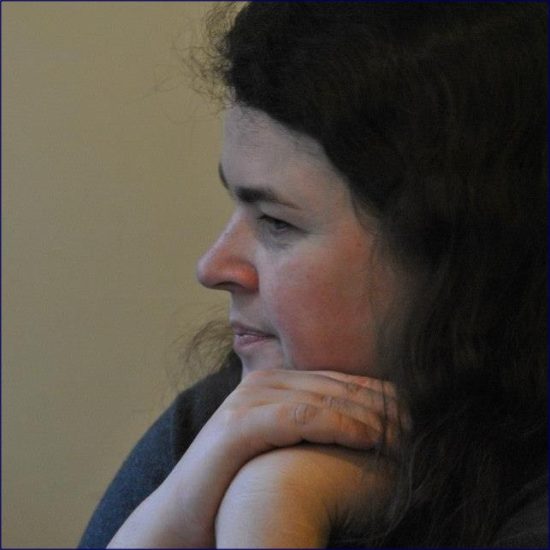 Report in the Forward by Michael Casper on the annual public portrayal of Jews and Roma during the Uzgavenes carnival in central Vilnius. (Image courtesy of Michael Casper.) The report notes the attitudes of the state sponsored Center for Ethnic Activity and the Vilnius City Municipality.
Report in the Forward by Michael Casper on the annual public portrayal of Jews and Roma during the Uzgavenes carnival in central Vilnius. (Image courtesy of Michael Casper.) The report notes the attitudes of the state sponsored Center for Ethnic Activity and the Vilnius City Municipality.
Roma
American Reporter Exposes Uzgavenes Festival’s Mockery of Jews and Roma
Uzgavenes Festival again Features Mockery of Jews and Roma
 The annual Uzgavenes festival, celebrated throughout Lithuania, again featured costumes and behavior making fun of – and perpetuating the worst stereotypes of – Roma and Jews (‘and monsters’). Roma and Jews comprise two of the country’s smallest and weakest minorities. Most of both communities were murdered during the Holocaust by the Nazis (with massive voluntary participation in the killings by locals). Today, progressive forces continue to live in hope that political, academic, legal, religious and cultural opinion makers in the country will rise to the occasion of explaining the essence, evil and dangers of such rampant racism unconvincingly disguised as the majority’s ‘national ethnographic tradition’. See below at 2008 (→ 6 Feb) for Michael Casper’s Forward report on that year’s event. Photo by Evaldas Butkevičius.
The annual Uzgavenes festival, celebrated throughout Lithuania, again featured costumes and behavior making fun of – and perpetuating the worst stereotypes of – Roma and Jews (‘and monsters’). Roma and Jews comprise two of the country’s smallest and weakest minorities. Most of both communities were murdered during the Holocaust by the Nazis (with massive voluntary participation in the killings by locals). Today, progressive forces continue to live in hope that political, academic, legal, religious and cultural opinion makers in the country will rise to the occasion of explaining the essence, evil and dangers of such rampant racism unconvincingly disguised as the majority’s ‘national ethnographic tradition’. See below at 2008 (→ 6 Feb) for Michael Casper’s Forward report on that year’s event. Photo by Evaldas Butkevičius.
Landsbergis. Then and Now.
O P I N I O N
Vytautas Landsbergis is one of the giants of the late twentieth century. Along with Poland’s Lech Wałęsa and then-Czechoslovakia’s Václav Havel, Landsbergis led his people from foreign domination to freedom and democracy. Nothing these gentlemen might later on have said or done to their own legacies, particularly in the subsequent century, can detract from their singular achievements in contributing to the downfall of the Soviet Union and the freedom of the subjugated nations on its western periphery.
In Parubanka, Roma People say History is Repeating Itself
O P I N I O N
by Lina Žigelytė
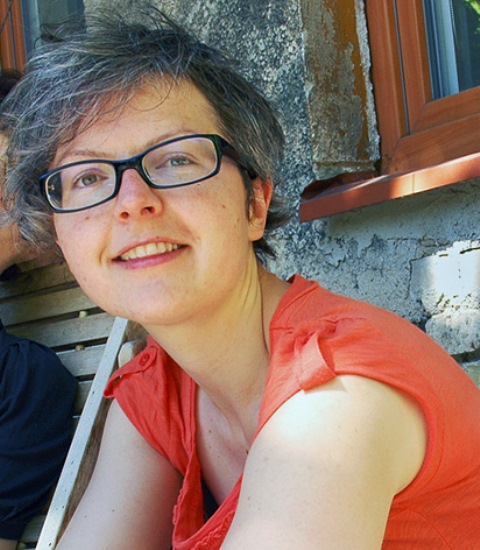
Lina Žigelytė
Residents of Parubanka immediately notice strangers. An empty police booth with broken windows marks the entrance to this Roma settlement in the outskirts of Vilnius. Here, there are no paved roads. A dusty dirt track winds along dozens of flimsy wooden houses and shacks. Some children walk barefoot on paths that have shards of glass and needles protruding from them. After a recent public transport reform, the nearest bus stop is about three kilometers away.
This area is home to 500 Roma people — raging from the very young to the elderly. Each time a car approaches or someone walks by, locals look over wooden fences that surround houses and often recognize visitors. The majority of these outsiders are so-called tarchoks – drug users, who come to Parubanka for a fix. I learnt of this term from Fiokla Kiurė.
Roma: Presumption of Guilt
O P I N I O N
by Vilma Fiokla Kiurė

Vilma Fiokla Kiurė (photo: Benediktas Januševičius)
The first international congress of Roma was held on April 8, 1971 in Oprington, England. In 1990, the date was designated International Roma Day.
On this day Roma celebrate and hold concerts, but also remember the most tragic eras in the history of the Roma: persecution by the Nazis and their collaborators in World War II and the resulting genocide of the Roma people. On this day the Vilnius Roma community floats wreaths of flowers on the Neris River in remembrance of their compatriots.
Roma who survived the Second World War, ethnic cleansing and genocide remember that the Nazi soldiers and their local police collaborators used simple external recognition to persecute the Roma. At that time the Roma were still wanderers, and it was a rare member of the community who had identification documents. Few had relationships with sedentary residents, making physical resemblance to the typical Roma the main indicator of ethnicity, in many cases guaranteeing death.
Roma Commemoration at Lety Site in the Czech Republic
O P I N I O N
by Monica Lowenberg
Most people know that six million Jews were murdered by the Nazis in the Holocaust.
Few people know that well over half a million Sinti and Roma Gypsies were murdered in the same ghettos, killing fields and concentration camps alongside the Jews.
What is the “Program for Roma Integration” in Lithuania?
H U M A N R I G H T S / R O M A I S S U E S / O P I N I O N
by Vilma Fiokla Kiurė
◊
Here in Lithuania, the words “Roma” and “discrimination” are regarded as inseparable. It seems that even the Roma community is reconciled with that. The situation, however, is worsening and what is currently happening in Kirtimai, a village on the outskirts of Vilnius, the capital city’s home to its most prominent tabor, or Roma settlement, and often referred to just as Kirtimai Tabor. What is happening is something larger than just “discrimination against Roma.”
For starters, the water has been disconnected in upper Kirtimai. There had never been a proper water supply but there was a water “column” used by some three hundred people. But it has been blocked off. Looking at the sight of baby carriages used for carrying urns of water is a sight unbelievable for the beautiful capital city of a European Union member state.
Roma in Lithuania: But What Does the Government Need To Do?
R O M A / H U M A N R I G H T S / O P I N I O N
by Vilma Fiokla Kiurė
◊
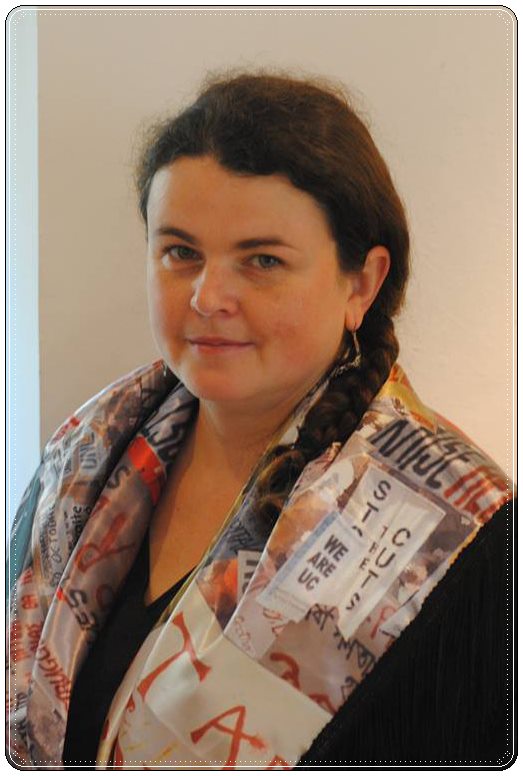
Vilma Fiokla Kiurė
“Which social group in the EU is most generally evicted from housing?” This was the question cheerfully posed by the host of the Good Morning Lithuania show on our national television. The viewer who called in said “Roma” and won a prize.
It can be pleasant to drink morning coffee while tuned to a TV quiz, but this time it was quite something else. The program’s entertaining format and the host’s frequent jokes are not very funny at all when such painful social issues are the subject of entertainment. But the episode well illustrates the public attitude towards the Roma here. Many Roma are still deemed to be distant, exotic and mysterious people, an object rather than a living community. Maybe because there is a lack of empathy and understanding in dealing with Roma integration problems and there are various language issues too.
When Both Law Enforcement and Politicians Cover Up Racism
HUMAN RIGHTS | RACISM | ROMA | OPINION
by Vilma Fiokla Kiurė
◊

Vilma Fiokla Kiurė
A Nigerian citizen was attacked with a knife and injured in Kaunas, Lithuania, earlier this month. Trying hard to avoid describing the assault as a racially motivated hate crime, law enforcement officials and the mainstream media alike explained that the incident was purely part of a private dispute. Strange to tell, reading through official statistics you would rapidly come to the conclusion that racist and xenopohobic crimes in Lithuania stand at about zero. And, that neo-Nazi minded youth are “just patriotic.”
It is no great secret in this part of the world that law enforcement officials and some politicians like to beautify the statistics, or to terminate or redefine proceedings brought in respect of racial or xenophobic hatred. One example comes to mind from 2011, when MPs J. Narkevičius and E. Zingeris appealed to the General Prosecutor’s Office to do something about the neo-Nazi ideology espoused in the song “Diktatūra” by the group “Šalčininkų rajonas” (Šalčininkai District).
Dr. Efraim Zuroff Awarded Gold Medal by Serbian President Tomislav Nikolic
BELGRADE—The president of Serbia, Tomislav Nikolic, today awarded a Golden Medal for Merit to Dr. Efraim Zuroff, the Simon Wiesenthal Center’s chief Nazi hunter and its Director of East European Affairs, as part of the celebrations of Sretenje, the Serbian republic’s national day. The rationale for the award, which was granted to Dr. Zuroff for “exceptional achievements” included his “selfless dedication to defending the truth about the suffering of Jews, and also Serbs, Roma and other nations during World War II.”
Lithuanian Jewish Community Chairperson Faina Kukliansky Issues Powerful Statement on Annual “Holiday” that Humiliates Jews and Roma
ANTISEMITISM | UŽGAVĖNĖS / SHROVETIDE | HUMAN RIGHTS | ROMA RIGHTS
◊
VILNIUS—Lithuanian Jewish Community chairperson Faina Kukliansky today issued a powerful statement on the community’s website condemning the newest call from some top politicians asking the population to revere a national holiday in Lithuania, Užgavėnės, or Shrovetide, that falls this year tomorrow, 28 February 2017. Defending History has been (intermittently) monitoring the day since 2008, as part of the mission to monitor antisemitism and racism, and to cover those sectors of Human Rights that tend to be wholly ignored by the lavishly funded, official human rights organizations here in the Lithuanian capital.
UPDATES AND INTERNATIONAL COVERAGE:
International Business Times; Lzinios.lt; Mako.co.il
A “Vilnius Model” for Roma Integration?
OPINION | ROMA RIGHTS | HUMAN RIGHTS
◊
by Vilma Fiokla Kiurė
◊
In April of 2016, the Vilnius City Municipality announced the launching of its Roma Integration Program, or “Vilnius (Kirtimai) Roma Tabor Community Social Integration Program for 2016-2019.” The municipality’s plans were widely discussed in the media, which in its own turn, came up with sensational headlines like “Program of Roma Integration and Tabor Eradication To Be Approved.” A curious fact: Roma representatives did not take part in the negotiation process for this major 700,000 euro project. They were not invited to even observe a single meeting. As ever, Roma are being “integrated” behind their own backs.
Why Do They Do It in the Winter?
OPINION | ROMA RIGHTS | HUMAN RIGHTS
◊
by Vilma Fiokla Kiurė
◊
A wave of nationalism and hatred is rolling through Europe. In Gdańsk, Poland, mayor Paweł Adamowicz, who encouraged democracy and tolerance, was killed. From Hungary, where the ultra-right powers, namely Orbán’s Fidesz party and its ideological neighbor, third-in-size Jobbik, have taken power, come the news of the worsening conditions of Roma people. Eviction of Roma in Miskolc is but one example of segregation and discrimination (on Youtube). Shocking footage from Bulgaria has also recently reached international Roma community (see on Facebook). The footage shows Roma houses being destroyed in the middle of the winter and the people resisting being suppressed and beaten. Apparently, after a conflict between two Roma youths and local soldiers, the Bulgarian government decided to collectively punish the Roma community by banishing them from the Voidinovo settlement by Plovdiv, which, by the way, is the European Capital of Culture 2019. The Bulgarian government is on a par with its Hungarian counterpart when it comes to discriminatory rhetoric and prejudice against the Roma.
Story of a Little Roma Boy in Modern Vilnius
OPINION | ROMA RIGHTS | HUMAN RIGHTS
by Vilma Fiokla Kiurė
◊
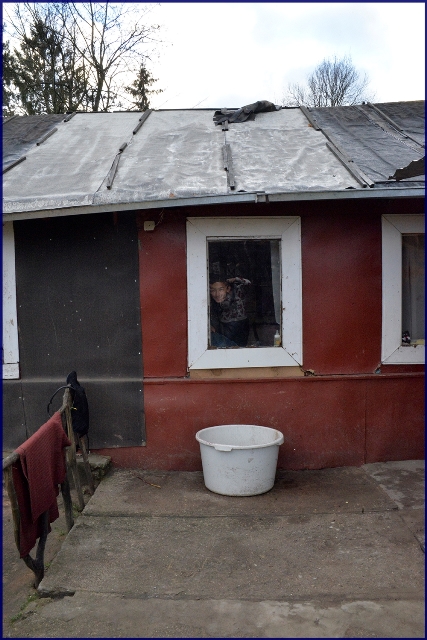
Vitia, a little Roma boy, looks out the window of his poor red house in Kirtimai, on the outskirts of Vilnius, the Lithuanian capital
◊
I thought for a long time about what to report about the situation of the Lithuanian Roma — about their lives today. And I decided to yell you about the little Roma boy called Vitia. Because, by telling his story I will also tell about the painful part of many Roma here in Lithuania in the final months of 2020.
But first a little background.
Roma in Lithuania: When a Lavishly Financed Program has a 4-5% Success Rate, and Half the Inmates in Nation’s Only Women’s Prison are Roma
OPINION | ROMA RIGHTS | WOMEN’S RIGHTS | HUMAN RIGHTS
by Vilma Fiokla Kiurė
◊
Back in 2017, I tried to acquaint the outside world, in Defending History, with some issues concerning the “Roma Integration Program” that was initiated by the Lithuanian Government and Vilnius Municipality in 2016. I noted that the main goal of the program was to raze the Roma settlement in Kirtimai to the ground and remove the Roma that used to live there, resettling them in scattered different places through Vilnius County.
Several years have passed. We can see how this Program has impacted Roma living conditions.
“Around half of the inmates in Lithuania’s only women’s prison are Roma women—while there are only a bit more than two thousand Roma in Lithuania, less than one percent of Lithuania’s estimated population of 2,795,000 for 2021.”
Roma Heroism in Ukraine Eases Some Prejudice
OPINION | ROMA RIGHTS | WOMEN’S RIGHTS | HUMAN RIGHTS
by Vilma Fiokla Kiurė
◊
At the supermarket door here in Vilnius, I met Olga, a Roma woman. I was surprised that security had not chased her away, since she was begging. Even more, they brought her a chair to sit on, since Olga was pregnant. I thought to myself: “What unseen humanity of the security guards!” I have seen more than once how the begging poor were chased away even from outdoor supermarket surroundings. As I started talking to Olga, we were approached by a nice, well-to-do woman, who donated to Olga a lot of food: sausages, sweet curd snacks for children, pasta, and oil. I was again pleasantly surprised.
However, talking to Olga quickly disabused me of my illusions that perhaps there is now more good will towards the Roma. She told me about the new hardships in these years of crises, as well as about how hard it is for vulnerable people to make ends meet these days.
“Do you think I’m not ashamed to stand here with my hand stretched out?”, asked Olga in tears and added: “I have five children. What else can I do?”
It has been a long time since I asked Roma about work, especially mothers of many, because I know very well how their lives so often progress, traditionally married off in chosen matches while in their early teens and, at only say twenty years of age, a woman can be the mother of multiple children.
Some Reflections, as the “Roma Integration Program” Comes to a Close
OPINION | ROMA RIGHTS | WOMEN’S RIGHTS | HUMAN RIGHTS
◊
by Vilma Fiokla Kiurė
◊
This year, the Vilnius “Roma Integration into Society Program,” which started in 2020, comes to an end. It is therefore an opportune moment to review how such projects work in Lithuania. Let me remind you that “Roma integration” project cost the taxpayers of our country 1.24 million euros. Looking from the standpoint of the “general public” in Lithuania, or from outside, it may appear that the Roma community lives well. An upper crust Roma restaurant has been operating in Vilnius for the third year. It promotes Roma culture. Roma performers can often be seen on television. In September 2023, the colorful International Roma Culture Festival called “Gypsy Fest” took place, during which a veritable caravan of luxury cars and carriages drove around Vilnius, emphasizing the romanticized vision of Roma life.
The sad truth is, however, that this is only a facade, a function of the tiny Roma elite, because the vast majority of Roma from the lower social strata, who call themselves “Čiorna Roma” (Black Roma), live as they have always lived — in social isolation and in abject poverty. It is the women and children who suffer the most. True, thanks to great efforts and good social initiatives, some sparks of hope do light up even for ordinary Roma. It is moreover good that the number of Roma women in prison has decreased significantly (see on this topic an earlier report in Defending History). They no longer constitute half the population of the Panevėžys women’s correctional facility, as had long been the case.
